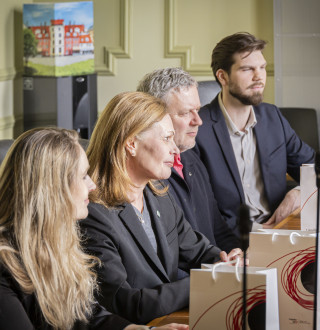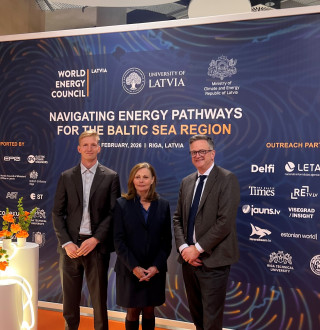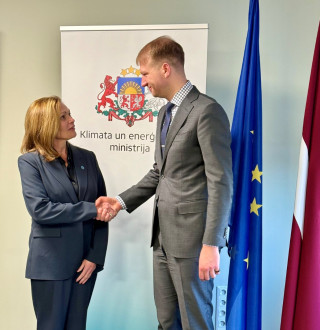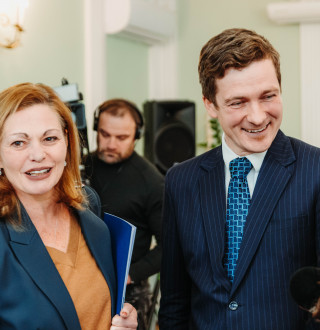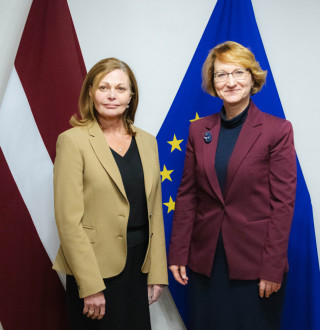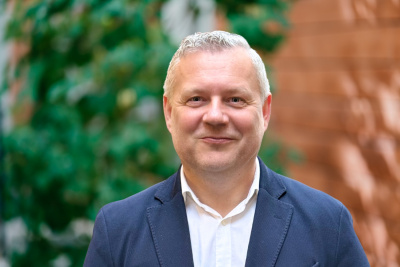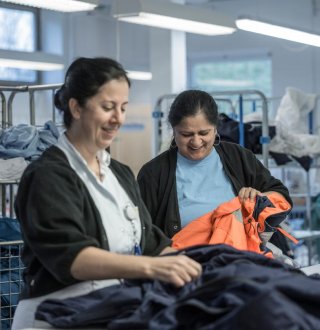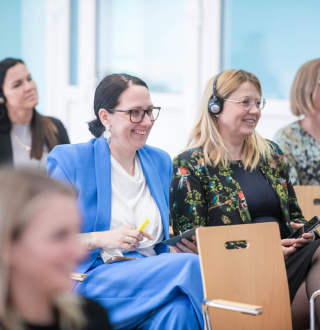Urban agriculture, an important aspect of sustainable urban living, is gaining momentum in the Nordic countries, driven by increased engagement from civil society. This practice involves cultivating, processing, and distributing food products, including herbs, within cities. Beyond its agricultural dimension, urban agriculture contributes to sustainable and healthy lifestyles, fosters cleaner air in cities, promotes social inclusion, and builds communities.
Innovative methods, such as vertical farming and hydroponics, are commonly employed in the urban setting due to limited space and specific environmental considerations. These and other methods are widely used in the Nordic countries; however, Latvian specialists, including representatives from the Institute of Horticulture, the Institute of Agricultural Resources and Economics, and Riga City Council, have also showcased competence on such matters during exchange visits as part of this project.
The goal of the project “Future of Urban Agriculture” (#FutureUA) is to identify and appraise executed agriculture initiatives in the urban setting, exchange knowledge and share experience in the field of urban agriculture and sustainable food production in the Nordic region and the Baltic states. Coordinated by the Nordic Council of Ministers’ Office in Latvia, Nordregio in Sweden, and NordForsk in Norway, the project aims to create a platform for discussions on the potential of urban agriculture in achieving the sustainable development goals of this region. It has brought together various stakeholders across partnering countries.
Throughout the project, the collaboration involved diverse stakeholders, including local authorities, SMEs, civil society organisations, universities, and Nordic organisations participating in events, conferences, and seminars. The project delved into the future of urban agriculture, emphasising three main aspects:
1) innovation and legislation,
2) culture and society, and
3) education and science.
Culminating in a conference in Stockholm on November 23 and 24, the #FutureUA project featured insightful presentations, freely accessible to the public. The event addressed the future of urban agriculture, drawing from the valuable contributions of Latvian counterparts: Solvita Zeipiņa and Līga Lepse from the Institute of Horticulture, Mārtiņš Eņģelis from Riga City Council, Lauma Žihare, Linda Ieviņa, Pēteris Lakovskis from the Institute of Agricultural Resources and Economics. The Nordic Council of Ministers’ Office in Latvia was represented by our colleague Maija Kāle, Sustainability Advisor.
This project holds significance for anyone engaged in urban agriculture issues or sustainable urban living. It has served as a platform for speakers and experts from different countries and organisations to share insights into urban agriculture development, as well as the prerequisites for success, and expectations placed on citizens. The project also facilitated the sharing of best practices and evaluated the transferability of Nordic experiences to the Baltic countries. Webinars, exchange trips to Helsinki, Oslo and Stockholm together with public discussions in Latvia, including those during the Conversation festival LAMPA, were key components of this comprehensive initiative.
Sites and themes covered by the project
Oslo, Norway:
- Master’s programme in urban horticulture. The Norwegian University of Life Sciences (NMBU) Master’s programme in Oslo.
- NordForsk. Organisation that promotes cooperation and research in the Nordic countries and other Baltic Sea region.
- NIBIO. Norwegian Institute of Bioeconomy Research.
- Gatemeyr School Garden. The largest school garden in Norway.
Stockholm, Sweden:
- Company Greenworks. Vertical gardens.
Presentations:
- Food Self-sufficiency in Five Nordic Island Societies. Presented by Mari Vojena Meijere, Nordregio. Article is available here.
- Nordic Food Environments and Behavior Change for Better Diets. Presented by Anna Berlina, Nordregio. Article is available here.
- Šilainių Gardens in Kaunas. Presented by Rūta Lukošiūnaitė.
- Shroomwell Innovation. Vertical farm for medicinal mushrooms in Southern Estonia.
Helsinki, Finland:
- Dodo. NGO that organises urban gardening, promotion, and related educational activities at grassroots and self-initiated level.
- Little Garden. Start-up creating vertical gardens in hangars in the Helsinki region.
- JooSoap. Start-up that turns used cooking oil into soap.
- Helsieni. Start-up that grows oyster mushroom.
- Edible Park. Public, educational community garden on an island in Helsinki.
- Hermannin viljelijät – Hermannin puutarha. A community garden open to the public in the park of a former tsarist prison.
- Visit to the Helsinki municipality.
Project partners’ impressions and insights on the project
Luciane Aguiar Borges, Senior Research Fellow at Nordregio:
“Urban agriculture offers pathways to achieving broader environmental, social, and economic outcomes, and thus, it is likely to assist in transitioning our cities from dysfunctional to functional ecosystems that work in line with sustainability and resilience principles.
Politicians must overcome the conception that agriculture is a matter only for rural areas and realise that growing food in cities has a great potential to address several challenges (e.g., climate regulation, biodiversity loss, food security, social inclusion) that our cities urgently require responses to.
Incorporating agriculture in urban built environments can accelerate the transformation of our (unsustainable) food systems while offering new options for reimagining urban life in harmony with nature.”
Kyösti Lempa, Special Advisor at NordForsk:
“This project combines past traditions with current technology to tackle future megatrends that may impact the greenery of cities and towns.
Lastadia in Riga, Turntable in Helsinki, and Geitmyra in Oslo are examples of how urban agriculture can be socially innovative, part of a circular economy, and inspire future generations to embrace urban agriculture. Berga, located in southern Stockholm, utilises amazing technologies to cultivate exotic crops in semi-arctic latitudes.
During the site visits, we discovered numerous ideas and solutions that we can implement. The key is to plant the seeds of these ideas in citizens’ minds so that they can learn to use them effectively. The most valuable resources that we have at our disposal are the diversity of plants and the engagement of citizens. These will help us to achieve our vision of sustainable urban agriculture in the future.”
Maija Kāle, Sustainability Advisor at the Nordic Council of Ministers Office in Latvia:
“We cannot talk about sustainability and resilience without talking about the future. The Future of Urban Agriculture project is another exercise in imagining what food systems might look like in an increasingly urbanised world. In the Nordic family institutions, we already have a great capacity to think about the future, so it has been rewarding to work with Nordregio and NordForsk in this project. It is only through cross-sectoral and interdisciplinary cooperation that we can think about the future with confidence, share knowledge, grow and cultivate new partnerships for cooperation.”
Līga Lepse, Lead Researcher at Institute of Horticulture:
“The possibility to join the activities of the project “Future of Urban Agriculture” gave excellent confirmation to our work in the project “Influence of agroecological conditions on the quality of vegetables in urban horticulture” (Roof2Fork).
We recognised the significance of gardening in the urban areas in many aspects: social, agricultural, ecological, cultural, and political. The experience exchange trips and visiting the institutions and case studies in Nordic countries as well as participating in the Conversation festival LAMPA broadened the spectrum of challenges in urban agriculture and gave some innovative ideas and future perspectives in research and practical implementation of aquaculture, mushroom growing, microgreens, and educational gardening. I hope this project will be more fruitful than we currently imagine.”
Linda Ieviņa, Researcher at the Institute of Agricultural Resources and Economics:
“I had a great opportunity to participate in project activities, including two UA events in Northern cities – Oslo and Stockholm. Participation in the project gave me new inspiring ideas to reflect upon and created a more comprehensive image of where we are and where we could get in terms of UA’s development. I saw many inspiring examples on successful UA implementation in the Nordic region and creative approaches in dealing with the respective limiting factors. The project brought together UA experts from various fields of expertise and views and allowed to share their experiences, encountered challenges and creative solutions. Expert gatherings gave the opportunity to build a common vision for UA’s development and its contribution towards a more sustainable future.”
Malm Nordlund, Head of Organisational Development at Dodo:
”The final conference of the Future Urban Agriculture research project tied well together strings that were unravelled during the earlier gatherings of the project. What I like with the project is that it has bound together the academic with the practical, got together activists with entrepreneurs and city officials with NGO actors. By looking at urban agriculture broadly and from many viewpoints we have had a good basis also for looking at what it can be in the future.”
Rūta Lukošiūnaitė, Co-founder of Šilainiai Gardens Initiative (Šilainių Sodai):
“The concept of urban agriculture is at very different stages of evolution around the Baltic Sea countries. It is great to observe and learn how the urban food system has not only persevered but evolved in Sweden, Finland, and Estonia. […] Participation in this conference has sparked new energy in me. Hopefully, soon this becomes a topic of national importance in Lithuania.”
Siim Raadik, CEO of Shroomwell Innovation:
“The Nordregio conference on Urban Agriculture held in Stockholm on November 22–24 was an enlightening and inspiring experience. The event brought together a diverse array of experts and enthusiasts passionate about sustainable urban development through agricultural innovation. The event not only showcased cutting-edge technologies and best practices but also emphasized the pivotal role of urban farming in addressing food security, environmental sustainability, and fostering resilient communities. Networking opportunities allowed for meaningful exchanges of ideas, fostering connections with like-minded individuals committed to shaping a greener, more sustainable urban future.”
Sebastian Eriksson Berggren, Associate Consultant at Technopolis Group:
”I found it very interesting to see the varying ways to approach urban agriculture. From research to communal activities, innovation, entrepreneurship, civil disobedience, design, and architecture. The gathering of like-minded from Finland, Sweden, Lithuania, Latvia, etc. was very inspiring.”
On 1 March, the final event of the project "The Future of Urban Agriculture" took place in Valmiera as part of the Vidzeme Innovation Week. Find out more about the event and view the photo gallery here.
On 31 May, the main findings of the project were presented at the webinar "Food Security in the World, Region, Country and Household" organized by the Nordic Council of Ministers' Office in Latvia. The programme and registration form is available here.
Project reference materials
To read more about the workshops and exchanges, click here.
Webinar videos are available here (on community) and here (on innovation and legislation).
To read more about the project and get related information, browse the website of the partner organisation – Nordregio.
Video recordings of the closing conference in Stockholm
Closing conference presentations (Part 1)
Closing conference presentations (Part 2)
Video of Kirmo Kivelä’s visit to Svenskt Aquaponik (Swedish Aquaponics)
Photos from the experience exchange visits in Finland
Photos from the experience exchange visits in Latvia
Photos from the experience exchange visits in Norway
Photos from the experience exchange visits in Sweden
